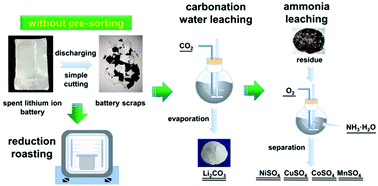A breakthrough method for the recycling of spent lithium-ion batteries without pre-sorting†
Abstract
Inspired by the process of “metallurgy first and then beneficiation” for disposing low-grade and complex mineral resources, we proposed a breakthrough method to recover valuable metals from spent entire lithium-ion batteries that experienced only discharge and simple cut, removing the pre-sorting process, which is an inevitable but problematic process in the commonly used hydrometallurgical method. Reduction roasting was first conducted to directly treat spent entire LIBs, and the cathode materials are dissociated and transformed to simple substances. Moreover, the harmful electrolytes, binder and membrane are decomposed into the gas, and can be disposed by the well-established, widely used technology. Over 81% of Li can be preferentially extracted from the roasted products by carbonation water leaching. In addition, more than 95% of Ni, Co and Cu can be leached by additional oxidation ammonia leaching, while Mn in the ammonia leaching residue can be recovered via beneficiation process. Finally, the ammonia solution can be reused after the recovery of valuable metals. Overall, this new recycling method with advantages of high metal recovery efficiency, easily accessible equipment and environmental friendliness can meet the requirements of green chemistry, and has great potential in industrial production.



 Please wait while we load your content...
Please wait while we load your content...